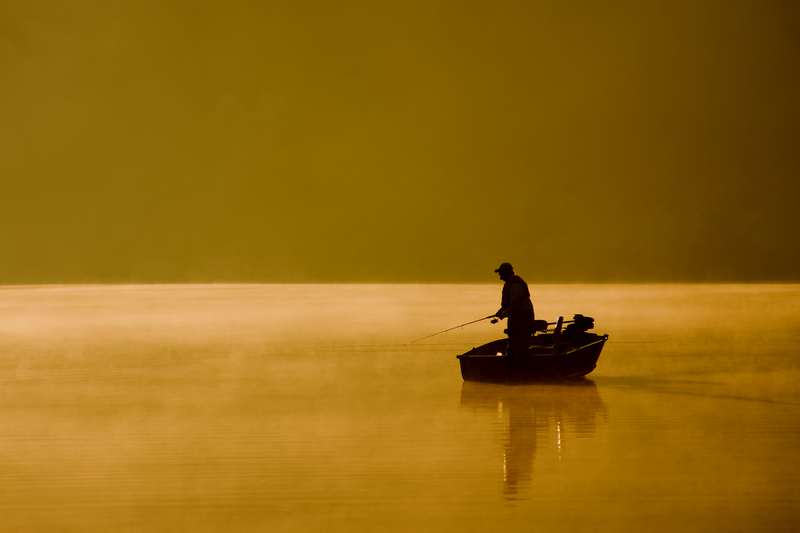Fishing myths are as abundant as fish stories.
Here are a few of the most popular myths and why they are untrue.
Bass don’t feed in cold water.
While bass only eat one-third as much food as they do in warmer weather, they still eat.
All year long, bass cruise around looking for food, and you can even catch bass through the ice.
Fish don’t bite in the rain.
Many anglers think that fish don’t bite during the rain. This is not true; you can be very successful fishing in the rain.
Fishing generally slows down during periods of low barometric pressure. Low pressure sometimes, but not always, accompanies a storm.
If it’s raining and the pressure is not low, keep on fishing!
Catfish barbels are dangerous.
Catfish barbels are feelers, not stingers. They use them to find food and identify objects.
You need to watch out for the spine on the dorsal fin because it is hard and sharp, but the barbels won’t hurt you.
Be quiet or you’ll scare the fish.
Talking or making noise doesn’t disturb fish. Don’t make noise in the water, but talking to your friends won’t make the fish go away.
You might want to be quiet to enjoy the sounds of nature, but that’s another issue entirely.
Fish have five-second memories.
It would be great if fish forget being hooked seconds after it happened.
Unfortunately for us anglers, fish remember baits that have hooked them in the past. One study showed that fish remember things for up to five months.
Catfish only eat at night.
You don’t have to fish for catfish only at night. These whiskered fish eat at all times of the day.
Catfishing at night can be incredibly productive, but it’s not the only time you can catch them.
Big fish only live in deep water.
Big or small, fish feed where food is present. Sometimes that’s deep water.
Sometimes it’s shallow water.
More often than not, the stretch of water you think is too shallow actually has some big fish in it. The largest northern pike, for example, often hunt in shallow weed-beds.
Bass are sight feeders.
Bass use their lateral line system to detect water movement and pressure. The lateral line comprises a line of nerves along the body of the fish and “canals” in the fish’s head.
This system helps the bass detect motion and target prey, and it’s one of the reasons that spinnerbaits and other vibrating lures are so effective.
Fishing is boring.
From an outside perspective, there are certainly times when fishing seems boring.
This is when the fish aren’t biting.
Most anglers take this time to appreciate their natural surroundings and don’t find it dull at all.
More often than not, you’ll have a friend around to keep things interesting. Slow fishing is a great opportunity to catch up or make future plans.
Fish can’t see objects on dry land while in the water.
Nothing could be further from the truth. There may be certain species that have terrible eyesight, but most fish can see the world outside of water.
Trout see through the surface tension of a flowing river in a cone-like funnel. They can see trees, bushes, bears… and you, if you’re not careful.
Drags should be set tight to stop fish.
Reels don’t have drags to stop fish; they’re meant to slow them. Setting your drag too tight is usually a recipe for disaster.
If a fish can’t take your line out, it will take it sideways. If it’s strong enough, it’ll break your line or gear.
Fish only bite when they’re hungry.
Fish obviously bite when they’re hungry, and most of the time this is the reason they do.
However, a sense of danger or sudden motion can also trigger a fish to attack. It’s fight-or-flight in the ocean, another consideration besides hunger.
If your line goes slack, you lost the fish.
This is a mistake beginning fishermen make all the time. They’re rod’s bent and the fish is pulling when suddenly—nothing.
99 percent of inexperienced anglers drop their head in dejection when this happens—but the fish may not be lost.
You see, fish are smart, but they’re also dumb. They’ll switch direction and run right at you, making it seem like they’re off your hook.
They’ll also eat a bait or lure that just had them hooked, if you leave them the chance.
While fishing is one of the most likely ways a person in a survival situation can get their hands on food, fishing myths can hamper their efforts.
This is particularly true if the myths discourage an angler from trying.
The understanding of fact versus fiction lets us overcome these myths and increase our fishing totals!
To learn even more fishing myths, check out Line and Sight.

Barry Handy